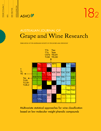
AUSTRALIAN JOURNAL OF GRAPE AND WINE RESEARCH
Scope & Guideline
Fostering Excellence in Grape and Wine Scholarship
Introduction
Aims and Scopes
- Viticulture Practices and Innovations:
Research on vineyard management techniques, including irrigation strategies, pruning methods, and rootstock selection, to optimize grapevine health and fruit quality. - Enological Processes and Quality Assessment:
Studies exploring fermentation processes, wine chemistry, and sensory evaluation to improve wine quality and develop new winemaking techniques. - Sustainability and Climate Adaptation:
Investigations into sustainable viticulture practices and the effects of climate change on grape growing and winemaking, focusing on adaptation strategies. - Consumer Preferences and Market Trends:
Analysis of consumer behavior, market dynamics, and the impact of wine characteristics on consumer acceptance and preferences. - Genetic and Molecular Research:
Exploration of genetic diversity, molecular traits, and biotechnological approaches to enhance grapevine resilience and wine characteristics.
Trending and Emerging
- Climate Change Adaptation Strategies:
Increasing research focused on how climate change affects grapevine phenology, disease management, and overall vineyard health, highlighting the need for adaptive strategies. - Sustainable and Innovative Viticulture:
A growing emphasis on sustainable viticultural practices, such as precision agriculture, water management, and the use of alternative inputs to enhance environmental stewardship. - Consumer-Centric Research:
Emerging studies on consumer preferences and market trends, exploring how wine characteristics influence consumer choices and the implications for marketing strategies. - Molecular and Genetic Insights:
A surge in genetic and molecular studies aimed at understanding grapevine resilience, disease resistance, and the improvement of wine quality through biotechnological approaches. - Integration of Technology in Viticulture:
An increasing focus on the use of technology, such as remote sensing and data analytics, to enhance vineyard management and wine production efficiency.
Declining or Waning
- Traditional Winemaking Techniques:
Research on conventional winemaking methods has decreased, likely due to a growing interest in innovative and sustainable practices that align with modern consumer expectations. - Generalist Studies on Grape Varieties:
There is a noticeable decline in broad studies of grape varieties without a specific focus on their unique characteristics or adaptation to environmental changes. - Non-Scientific Perspectives on Wine Culture:
Papers addressing wine culture from a non-scientific perspective, such as historical or cultural discussions, have become less frequent, as the journal shifts towards empirical research.
Similar Journals

Current Research in Food Science
Leading the Charge in Food Science AdvancementsCurrent Research in Food Science is a leading peer-reviewed academic journal published by Elsevier, specializing in the dynamic field of food science. Since its transition to an Open Access model in 2019, the journal has broadened its reach, contributing significantly to the dissemination of high-quality research. With strong rankings, including a Q1 quartile status in Applied Microbiology and Biotechnology, Biotechnology, and Food Science, it stands out as a pivotal resource for scholars. Based in the Netherlands, current research published within its pages spans a wide range of relevant topics, ensuring that researchers and practitioners stay abreast of the latest advancements. The journal's impressive Scopus rankings enhance its credibility, with a percentile standing in the 74th to 83rd range across relevant categories, underscoring its impact and importance in the academic community. Current Research in Food Science aims to foster the exchange of innovative ideas and foster collaborative efforts among researchers, making it an essential resource for those engaged in advancing the science and technology of food.

OENO One
Exploring the Depths of Wine Science.OENO One, published by the International Viticulture and Enology Society (IVES), stands as a leading open-access journal dedicated to advancing the science of viticulture and enology since its inception in 2015. Operating out of France, this innovative journal is pivotal in disseminating high-quality research that impacts the fields of Food Science and Horticulture, evidenced by its notable category quartiles—Q2 in Food Science and Q1 in Horticulture as of 2023. With Scopus rankings placing it in the 82nd percentile in Horticulture and the 62nd percentile in Food Science, OENO One delivers timely insights and robust findings to its readers, fostering collaboration and knowledge exchange among researchers, professionals, and students alike. The journal embraces a forward-thinking approach, featuring research from various aspects of wine production, quality assessment, and viticultural practices, making it an essential resource for anyone involved in these disciplines.

ISRAELI JOURNAL OF AQUACULTURE-BAMIDGEH
Connecting researchers and practitioners in the world of aquaculture.Welcome to the Israeli Journal of Aquaculture-Bamidgeh, published by AquacultureHub Inc, a pivotal platform dedicated to advancing the field of aquaculture studies since its inception in 1988. With a focus on innovative research and practical applications within the realms of Agronomy and Aquatic Sciences, this journal has established a reputation for disseminating high-quality findings that contribute to sustainable practices in aquatic farming. The journal, although classified in the Q3 and Q4 quartiles for its respective categories, offers valuable insights for researchers and practitioners alike, allowing them to stay abreast of developments in aquaculture challenges and solutions. While it's currently not an Open Access journal, the Israeli Journal of Aquaculture-Bamidgeh is committed to providing a thorough avenue for scholarly exchange and fostering collaborations across the global aquaculture community. Explore impactful studies and the latest trends to enhance your knowledge and research in this vital sector.
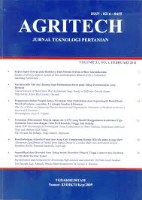
Agritech
Shaping Sustainable Practices for a Greener TomorrowAgritech is a prominent open-access journal dedicated to advancing the field of agricultural technology. Published by UNIV GADJAH MADA, FAC AGRICULTURAL TECHNOLOGY, this esteemed journal disseminates innovative research and cutting-edge practices that contribute significantly to sustainable agriculture, precision farming, and environmental stewardship. Launched in 1999, Agritech has established itself as a vital resource for researchers, professionals, and students alike, providing a platform for the exchange of ideas and findings that shape the future of agricultural technology. By embracing an open-access model, the journal ensures that high-quality research is accessible to a global audience, promoting collaboration and knowledge sharing in the agricultural community. With an ISSN of 0216-0455 and an E-ISSN of 2527-3825, Agritech remains committed to enriching agricultural practices and policies through rigorous scientific inquiry and innovation.

JOURNAL OF THE JAPANESE SOCIETY FOR FOOD SCIENCE AND TECHNOLOGY-NIPPON SHOKUHIN KAGAKU KOGAKU KAISHI
Elevating Research in Culinary Science and TechnologyWelcome to the JOURNAL OF THE JAPANESE SOCIETY FOR FOOD SCIENCE AND TECHNOLOGY-NIPPON SHOKUHIN KAGAKU KOGAKU KAISHI, a pivotal platform for the advancement of food science and technology. Published by the Japan Society for Food Science and Technology, this esteemed journal has been contributing to the field since 1995 and continues to publish innovative research and reviews that foster knowledge and collaboration among researchers, professionals, and students interested in food science. Although it currently holds a Q4 ranking within the Food Science category, the journal's commitment to disseminating valuable insights showcases its potential as a resource for emerging trends and applications in food technology. While it does not offer open access options, it maintains a rigorous peer-review process to ensure the quality of its content. As this journal progresses into its convergence years through 2024, it remains an essential resource for those passionate about exploring the intersections of food science and technology in Japan and beyond.

Perspectiva Geografica
Engaging Minds in the Study of Geography and Its ImpactPerspectiva Geografica is a distinguished open-access journal published by the UNIV PEDAGOGICA & TECNOLOGICA COLOMBIA, dedicated to advancing the field of geography. Launched in 2005, this journal provides a platform for researchers, academics, and practitioners to disseminate and discuss innovative ideas, empirical research, and critical analyses pertaining to geographic issues, with a special focus on Latin America. Perspectiva Geografica aims to foster interdisciplinary dialogue, encouraging contributions that explore the interplay between geographical phenomena and socio-economic dynamics. Designed for a global readership, this journal welcomes submissions that not only adhere to rigorous academic standards but also engage with pressing geographical challenges of our time. With a commitment to enhancing accessibility to quality research, Perspectiva Geografica is an essential resource for scholars and students seeking insights into both theoretical and applied geography.

AGRONOMIA MESOAMERICANA
Championing open access to enrich the agronomy landscape.AGRONOMIA MESOAMERICANA is a distinguished open-access journal published by UNIV COSTA RICA, dedicated to advancing knowledge in the fields of agronomy, crop science, food science, and soil science. Since its inception in 1990, the journal has provided a platform for researchers and professionals to disseminate their findings, contributing significantly to the agricultural sciences. With an E-ISSN of 2215-3608, it operates from Costa Rica, specifically from the Centro Investigaciones Agronómicas, situated in San José. Despite its current classification in the Q4 quartile for 2023 in the respective fields, it aims to stimulate academic discourse and inspire innovative solutions to pressing agricultural challenges. The journal attracts a diverse audience and encourages submissions that focus on sustainable practices, food security, and environmental stewardship, making it an essential resource for researchers, professionals, and students alike seeking to enrich their understanding and share crucial insights in the agronomy landscape. Open access ensures that all published research is freely available, fostering collaboration and knowledge exchange worldwide.
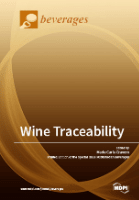
Beverages
Exploring the Science Behind Every SipBeverages is a premier open access journal published by MDPI, dedicated to the study of all aspects related to beverages, including their production, consumption, sensory properties, and health implications. Since its inception in 2015, the journal has established a notable presence in the field of Food Science, currently ranking in Q2 according to the latest 2023 category quartiles. With an ISSN of 2306-5710, it provides a platform for researchers, professionals, and students to share innovative research and insights that can advance the understanding and quality of beverage-related science. As an open access journal, Beverages ensures wide accessibility to its content, fostering collaboration and dissemination of knowledge across the global academic community. Based in Basel, Switzerland, the journal embodies a commitment to high-quality research and impactful contributions to the beverage industry and academia.
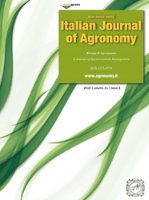
Italian Journal of Agronomy
Empowering the agricultural community with open access research.The Italian Journal of Agronomy is a prestigious, peer-reviewed outlet dedicated to advancing research and scholarship in the field of agronomy and crop science. Published by PAGEPRESS PUBL in Italy, this journal is committed to providing a platform for the dissemination of high-quality research since achieving its Open Access status in 2006. With an ISSN of 1125-4718 and an E-ISSN of 2039-6805, it is recognized for its contribution to the scientific community, boasting a commendable Q2 category ranking in Agronomy and Crop Science as of 2023. The journal's impressive Scopus ranking places it in the 75th percentile within General Agricultural and Biological Sciences and the 69th percentile in Agronomy and Crop Science, reflecting its significant impact and relevance. Covering a wide range of topics relevant to agriculture, from sustainability practices to innovative farming techniques, the Italian Journal of Agronomy serves as an essential resource for researchers, professionals, and students seeking to enrich their knowledge and contribute to the advancement of the agricultural sciences.
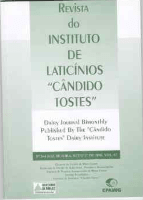
Journal of Candido Tostes Dairy Institute
Transforming Dairy Knowledge into Practical SolutionsJournal of Candido Tostes Dairy Institute, published by the prestigious INST LATICINIOS CANDIDO TOSTES, has established itself as a vital resource in the field of dairy science and technology. This Open Access journal, operating since 2008, provides an inclusive platform for researchers, professionals, and students to share groundbreaking findings and innovative practices related to dairy production, processing, and quality. Located in Brazil, this journal aims to advance knowledge and standards within the dairy industry, ensuring global access to high-quality, peer-reviewed research. The journal not only contributes to the scientific community but also supports practical advancements that benefit dairy producers and consumers globally. By fostering collaboration among scholars and practitioners, the Journal of Candido Tostes Dairy Institute plays a crucial role in shaping the future of dairy sciences. We encourage contributions that explore novel aspects of dairy research, thereby bridging theoretical insights with industry applications.